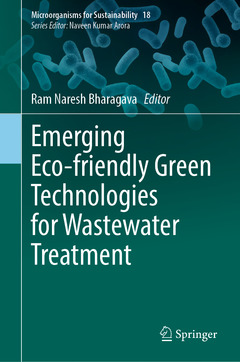Description
Emerging Eco-friendly Green Technologies for Wastewater Treatment, 1st ed. 2020
Microorganisms for Sustainability Series, Vol. 18
Coordinator: Bharagava Ram Naresh
Language: English
Subject for Emerging Eco-friendly Green Technologies for Wastewater...:
Publication date: 03-2020
Support: Print on demand
Publication date: 03-2021
351 p. · 15.5x23.5 cm · Paperback
Description
/li>Contents
/li>Biography
/li>Comment
/li>
As we know, rapid industrialization is a serious concern in the context of a healthy environment and public health due to the generation of huge volumes of toxic wastewater. Although various physico-chemical and biological approaches are available for the treatment of this wastewater, many of them are not effective. Now, there a number of emerging ecofriendly, cost-effective approaches utilizing microorganisms (bacterial/fungi/algae), green plants or their enzymes, and constructed wetland treatment systems in the treatment of wastewaters containing pollutants such as endocrine disrupting chemicals, toxic metals, pesticides, dyes, petroleum hydrocarbons and phenolic compounds.
This book provides a much-needed, comprehensive overview of the various types of wastewater and their ecotoxicological effects on the environment, humans, animals and plants as well as various emerging and eco-friendly approaches for their treatment. It provides insights into the ecological problems and challenges in the treatment and management of wastewaters generated by various sources.Ram Naresh Bharagava is an Assistant Professor in Department of Microbiology, Babasaheb Bhimrao Ambedkar University, Vidya Vihar, Raebareli Road, Lucknow, Uttar Pradesh, India. He earned B.Sc. in Biology from University of Lucknow, Lucknow and M.Sc. in Molecular Biology and Biotechnology from Govind Ballabh Pant University of Agriculture & Technology (GBPUAT), Pantnagar, Uttarakhand (U.K.), India. He did Ph.D in Microbiology from Indian Institute of Toxicology Research (CSIR-IITR), Lucknow and Pt. Ravishankar Shukla University, Raipur, Chhattisgarh, India. He published one author book and eight edited books and more than 140 research items in National and International journal of repute. His major thrust areas of research are Biodegradation and Bioremediation of Environmental Pollutants, Metagenomics and Wastewater Microbiology. He is life member of the Indian Science Congress Association (ISCA), India, Association of Microbiologists of India (AMI), Biotech Research Society (BRSI), and Academy of Environmental Biology (AEB).
Provides a detailed knowledge on the various existing wastewater treatment approaches (physico-chemical and biological) with their merits, demerits and future prospects
Presents detailed knowledge on the various emerging and eco-friendly approaches for wastewater treatment and their useful byproducts that may be useful in sustainable development of society
Useful for a wide range of students, scientists and researchers working in the area of microbiology, biotechnology, environmental sciences with the fundamental and advance knowledge on the various types of wastewater, their ecological & health implications, treatment/management and challenges




